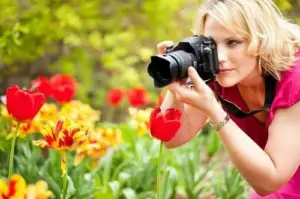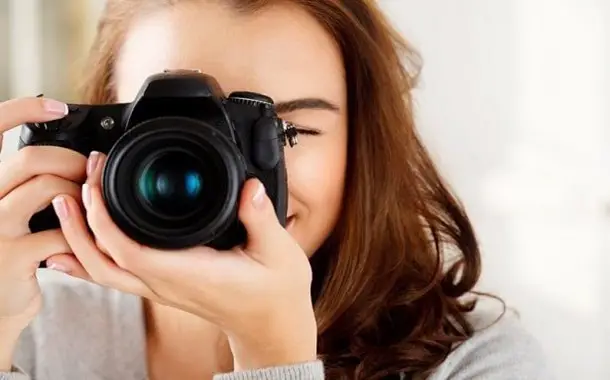How Much Does it Cost to Become a Photographer?
Last Updated on January 29, 2024
Written by CPA Alec Pow | Content Reviewed by ![]() CFA Alexander Popinker
CFA Alexander Popinker
Deciding to pursue a career in photography can seem like an expensive endeavor. However, with careful planning and budgeting, it is possible to break into this competitive field without breaking the bank.
This guide examines the typical costs associated with building a photography business, so you can make informed decisions about your investment. Read on to learn the price range for turning your passion into a profession.
How Much Does it Cost to Become a Photographer?
The full cost of becoming a professional photographer ranges widely, but plan on investing $10,000 to $30,000 when you factor in equipment, education, studio setup, software, marketing expenses, insurance, and other startup costs.
The exact total depends on your specialty, whether you choose to get a degree, and the scale you want for your business. With strategic purchases and free learning resources, you can launch a photography career without spending a fortune.
Investing in Cameras and Lenses
One of the biggest upfront costs for aspiring photographers comes from buying gear. The specific camera and lenses you need depends on your niche, but expect to spend $2,500 to $10,000 just on this essential equipment.
Beginners can start with an entry-level DSLR like a Canon Rebel that costs $500 to $1,000. However, professional photographers typically invest in advanced full-frame DSLR cameras that range from $2,000 to $4,000 for the body only. These high-end cameras from brands like Nikon and Canon provide image quality, durability, and features necessary for paid clients.
You will also need an assortment of lenses to capture different types of shots. A good starter collection may include a 50mm prime lens for $200, a wide-angle zoom lens for $500 to $1,000, and a telephoto zoom lens for $500 to $2,000. Building up your lens collection over time gives you the versatility to shoot landscapes, portraits, sports, macros, and more. Expect to spend $3,000 to $10,000 on lenses to have professional capabilities.
Other camera gear like flashes, filters, tripods, and camera bags will cost around $1,000 to $3,000. Don’t forget extra batteries, memory cards, and hard drives for storage, which add another $500 to $2,000. Protect your investment by insuring your equipment.
Classes, Workshops, and Degrees
While you can teach yourself photography with free online tutorials, formal training accelerates skill development. From short workshops to multi-year degrees, here are photography education options with typical price ranges:
- Local adult education classes – $100 to $500 per course
- Private lessons from a pro photographer – $100 per hour
- Online courses and video tutorials – $20 to $200 per course
- Photography workshops – $200 to $1,000 for 1 to 3 days
- Certificate programs – $2,000 to $5,000 for 3 to 12 months
- Photography colleges – $20,000 to $50,000+ for 2 to 4 year degrees
Look for student discounts on gear rentals, software, and admission fees. Build connections through groups like PPA for guidance. Be selective in picking educational investments with the best ROI.
Setting Up a Studio – Space, Backdrops, and Lighting
Having a dedicated studio space allows maximum creativity and control for portrait, product, and commercial shoots. Empty rooms or warehouses can cost $200 to $2,000 per month to rent. Transforming these raw spaces requires an additional budget for furnishings and equipment.
- Backdrops – $100 to $1,000 for various colors and materials
- Lighting gear – $500 to $3,000 for strobes, stands, modifiers
- Props – $20 to $500 per themed set
- Rentals – $50 to $500 per week for specialty items
Factor in utilities, insurance, maintenance, and rent when determining whether an owned or rented space best fits your budget. Also evaluate costs for location permits and parking.
Software and Editing Tools – Post-Processing Power
 Your computer hardware and editing software significantly impact efficiency and quality in processing raw camera files into polished portraits, products, and art.
Your computer hardware and editing software significantly impact efficiency and quality in processing raw camera files into polished portraits, products, and art.
- Photo editing computer – $1,000 to $3,000 for optimal performance
- Adobe Creative Cloud – $10 to $80 per month for common programs like Photoshop and Lightroom
- Plug-ins – $50 to $200 per specialized tool
- Online backup – $5 to $20 per month to securely store files
Cheap or free alternatives exist for those on a tight budget. Leverage free trials before purchasing programs long-term.
Ongoing Maintenance and Upgrades
The initial outlay on equipment and software represents just a fraction of what you will invest over a decades-long photography career. Maintaining gear and continually improving your tools requires an ongoing budget.
- Camera and lens servicing – $100 to $1,000 per device every few years
- Equipment insurance – $250 to $2,500 per year
- New releases – $500 to $5,000 every 2 to 4 years for latest gear
- Backup storage – $100 to $1,000 per year
- Software updates – $10 to $50 monthly Adobe subscription
Factor in 10% to 30% of original costs annually for maintenance and upgrades. Staying current helps you remain competitive.
Business and Marketing Expenses
Starting a full-time photography business involves significant legal, accounting, advertising, and other expenses.
- Incorporation – $100 to $1,000 for structures like LLC
- Accounting software – $5 to $50 per month
- Website design – $500 to $5,000 for development
- Business cards – $50 to $500 for initial print run
- Search engine ads – $0.50 to $5 per click
- Social media marketing – $300 to $3,000 per year
Keep startup costs lean by doing as much yourself as possible. Outsource to experts when the benefits outweigh the price.
You might also like our articles about the cost of a wedding photographer, professional headshots, or senior pictures.
Insurance and Legal Considerations
Operating a legitimate photography business requires proper licensing, taxes, insurance, and adhering to regulations.
- Business license – $50 to $500 depending on location
- Sales tax registration – $0 to $150
- General liability insurance – $400 to $1,200 per year
- Errors and omissions insurance – $600 to $2,000 per year
- Lawyer fees – $100 to $200 per hour
Do not ignore legal and insurance aspects. Paying a little upfront saves huge headaches down the road.
Building a Photography Portfolio
A professional portfolio showcasing your best work is the most powerful marketing tool and is essential for attracting clients.
- Website hosting – $60 to $300 per year for online portfolio
- Printing – $100 to $1,000 for physical albums and books
- Test and passion shoots – $0 to $5,000 for specialized projects
- Contests and publications – $50 to $200 per submission
Budget for creation and promotion to get your portfolio seen. This drives paid job opportunities.
Networking Events and Continuing Education
Ongoing efforts towards building your skills and reputation also require an investment.
- Conferences – $200 to $2,000 for multi-day events including travel
- Workshops and seminars – $100 to $500 for short programs
- Membership fees – $100 to $500 per organization like PPA
- Books and tutorials – $5 to $100 per training resource
Staying current on equipment, techniques, and industry trends is critical for a sustainable photography career. Do not neglect continued learning.
In Summary
Launching a professional photography studio requires a significant financial investment and ongoing budget. But by purchasing key items, utilizing free learning tools, establishing your reputation, and operating leanly at first, you can break into this competitive creative field without breaking the bank if you budget wisely and spend smart.
Expect an initial investment between $10,000 to $30,000 including equipment, education, marketing expenses, insurance, and other startup costs. With passion and diligence, photographers can recoup their investment and ultimately earn an excellent living while doing what they love.
FAQ: Quick Answers
How much does it cost to get started as a photographer?
Expect around $10,000 on initial equipment, education, and business expenses to launch a basic photography career. Start with a used DSLR camera, a couple of lenses, editing software, website hosting, a business license, and insurance. Add gear and services as you build clients.
Do photographers make a lot of money?
Most photographers earn $30,000 to $50,000 per year starting out, with high potential to earn over $100,000 annually with an established business. Income varies based on niche, clients, and whether you work part-time or full-time. Patience is required to build a reputation before higher earning potential.
How long will it take me to become a photographer?
It takes 1 to 3 years to go from photography beginner to working pro. The fastest path is to take courses while immediately building your portfolio and marketing yourself. Be prepared to start slowly with lower paid gigs at first. Consistently improve your work and skills.


Leave a Reply
Want to join the discussion?Feel free to contribute!